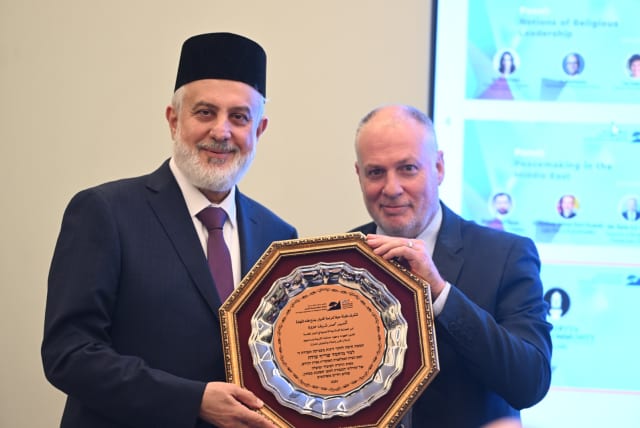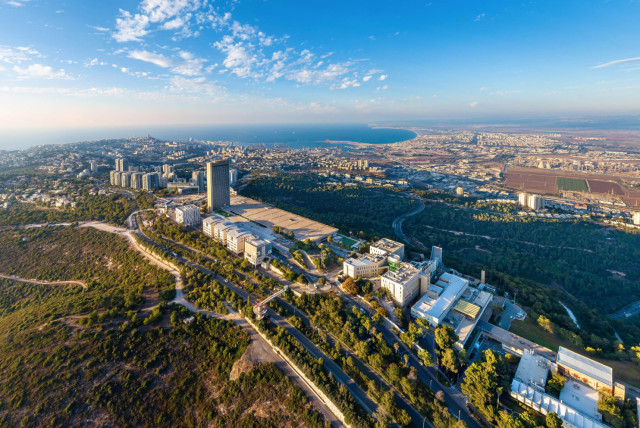Faith leaders unite in Haifa to champion religious diversity amid tensions

The timing of the event is particularly significant, as political strife and surging violence dominate headlines in Israel, while the Middle East conflict continues to present complex challenges.
The University of Haifa hosted an event on Wednesday that brought together influential faith leaders to shed light on the significance of religious diversity amidst escalating tensions.
Titled "Religious Leadership in the 21st Century - Facing Continuous and Emerging Challenges," the conference was organized by the University's Laboratory for Religious Studies. This esteemed institution is dedicated to fostering inter-religious dialogue and understanding through research initiatives and public outreach.
The timing of the event is particularly significant, as political strife and surging violence dominate headlines in Israel, while the Middle East conflict continues to present complex challenges.
Against this backdrop, the conference aimed to explore the crucial roles played by religious leaders on both domestic and regional levels. It sought to deepen understanding of how their influence can be instrumental in addressing various concerns, transcending religious boundaries.
Uriel Simonsohn, the head of the University's Laboratory for Religious Studies, emphasized the importance of the conference during this tumultuous period: "This is a dark moment in the history of Israel; its ramifications for our region cannot be overstated."
"But there is also something very important to learn from it: the old divisions - left/right, Jewish/non-Jewish, religious/secular and so on, are becoming less relevant than before," he continued. "The prospect of new alliances has never been greater, with new intersections and bridges forming gradually to the surprise of many, but also as confirmation to past prophecies. Interreligious dialogue and collaboration are pivotal for safeguarding our achievements and ensuring a viable future for generations to come."
Event featured an array of esteemed speakers
The event featured an array of esteemed speakers who shared their insights and experiences. Addressing the audience via Zoom, Adv. Karm A.A. Kahn QC, Prosecutor of the International Criminal Court (ICC) at the Hague, emphasized the importance of religious leaders in building a more peaceful world.
He remarked, "That diversity and common voice that religious leaders have a role to play in building a more peaceful world for our children is one that should on all of us. As we survey the world at the moment, one obvious truth emerges - there's an ebbing away of confidence in politicians and international institutions."
The conference included panel discussions on various pertinent issues, with contributions from notable figures such as United Arab List Leader Dr. Mansour Abbas, Mayor of Haifa Dr. Einat Kalish-Rotem, Rabbi Eliezer Weiss from the Rabbinic Council of Israel and Prof. Annabel Herzog, scholar of political theory at the University of Haifa.
The event brought together diverse perspectives, fostering meaningful exchanges and deeper understanding.
One poignant highlight of the conference was a tribute to the Islamic Ahmadiyya community for their efforts in promoting coexistence in Israel's north. University of Haifa President Prof. Ron Robin, Sheikh Muwaffak Tarif (spiritual leader of the Druze community in Israel), Amir Muhammad Sharif Odeh (head of the Islamic Ahmadiyya community in Israel) and Uriel Simonsohn delivered remarks honoring the community's contributions.
Robin expressed his admiration for the Islamic Ahmadiyya community and its commitment to peace. He remarked, "It puzzled me immensely. How is it possible that such peace-loving people who have nothing but understanding and empathy for others are treated in that manner in an Islamic country? It gives me great pleasure to address you here at a place that's diametrically different."
The University of Haifa's Laboratory for Religious Studies plays a vital role in advancing the concept of a shared society in Israel's most diverse major city. With 45% of its undergraduate student body comprising Arabs, the institution actively promotes inclusivity.
Moreover, the University of Haifa's commitment to higher education enables socioeconomic advancement, with 47% of its undergraduates being the first in their families to pursue higher education. This dedication to education and social progress positions that university as an anchor for the region.
The conference concluded with a renewed commitment to interreligious dialogue and cooperation. By fostering understanding and collaboration among faith leaders, the University aims to contribute to a more harmonious and inclusive future in Israel and beyond.
In a time of uncertainty and turmoil, such initiatives provide hope for building bridges of understanding and peace across diverse communities.
Jerusalem Post Store
`; document.getElementById("linkPremium").innerHTML = cont; var divWithLink = document.getElementById("premium-link"); if (divWithLink !== null && divWithLink !== 'undefined') { divWithLink.style.border = "solid 1px #cb0f3e"; divWithLink.style.textAlign = "center"; divWithLink.style.marginBottom = "15px"; divWithLink.style.marginTop = "15px"; divWithLink.style.width = "100%"; divWithLink.style.backgroundColor = "#122952"; divWithLink.style.color = "#ffffff"; divWithLink.style.lineHeight = "1.5"; } } (function (v, i) { });

